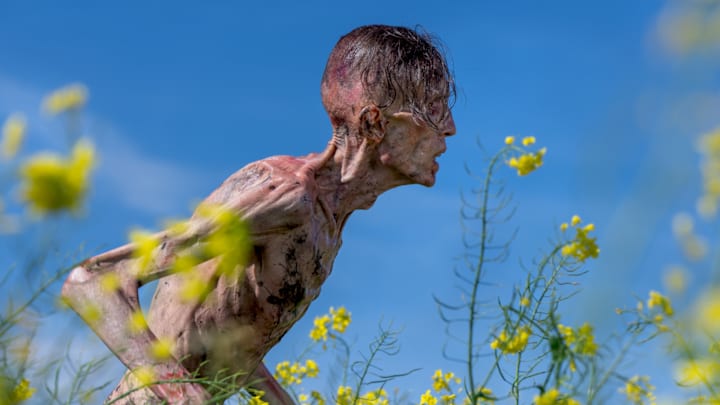When the film 28 Days Later was originally released in 2002, it brought together a trio of director Danny Boyle, writer Alex Garland, and actor Cillian Murphy that somehow struck lightning in a bottle and created one of the best zombie, and arguably horror, films of the past quarter century.

28 Days Later was beautifully filmed and captured the isolation of a deserted London that few horror films have been able to match. It also started a revolution of zombie movies, books, and TV shows and was praised for its usage of fast-running infected compared to the slow-moving zombies we've come to expect.
This eventually led to a sequel, 28 Weeks Later, that unfortunately didn't have the same impact on audiences, critics, or the culture as a whole. There isn't anything glaringly wrong with the sequel, but it lacks the human element that made the first film thrive. After the disappointment of the film, it seemed unlikely the franchise would continue, but the new release 28 Years Later proves it was well worth the wait.
28 Years Later reunites director Danny Boyle and writer Alex Garland, who both worked on the original film. They're joined by cast members Alfie Williams (Spike), Jodie Comer (Isla), Aaron Taylor-Johnson (Jamie), and Ralph Fiennes (Dr. Ian Kelson).

After skipping out on 28 Weeks Later, Boyle and Garland quickly retconned 28 Weeks by noting that the Rage virus that causes the infection has been eradicated in continental Europe. This not only makes the story feel tighter, it also creates a sense of connection with the viewers and the cast members as we now know the virus is only local to them.
Although Spike is only 12 years old, his father Jamie decides they should visit leave their island and visit the mainland as part of a coming-of-age ritual. As they begin to explore the mainland, they come across an Alpha, members of the infected who are larger, stronger, and smarter than the typical variations we've seen in other films.
Introducing the Alphas is a smart movie by Boyle as it creates a sense of equality amongst the living and the infected. The Alphas aren't going down with one shot and they're not used as fodder to rack up kill counts for the characters, and it flips the dynamic of Spike and Jamie being the hunters to suddenly becoming the hunted.
After spotting a fire in the distance during their excursion to the mainland, Spike learns that it's from a former doctor (Fiennes) who the islanders believe is insane. Believing the doctor can help his mother (Comer), he makes the decision to bring her onto the mainland with him and try to figure out what's causing her mystery illness.

Alfie Williams plays the part of Spike with such naivety that even though it's clear to the audience his mom has no chance of surviving, we still hope he'll find a way to make it happen. Utilizing younger actors in these roles can always be hit-or-miss, but Boyle and Garland clearly knew how to make the character work without coming off as either too innocent or too smart for his young.
Spike and Isla eventually come across a pregnant infected woman, and to surprise of the audience and the characters, the baby is somehow uninfected. The introduction of the baby not only creates a level of tension as it causes an Alpha to begin hunting them, but it also tactfully showcases that all the infected were humans at one point in their lives.
After being saved by Kelson, Spike and Isla visit a sanctuary he has created to honor the infected who have died. Kelson is masterfully played by Fiennes who somehow comes across as intelligent, compassionate, strong, and humorous all within the first few minutes of his introduction.

Spike begs Kelson to help his mom, but after diagnosing her with terminal cancer, she decides to be killed before the disease takes control of her body completely. Comer plays the role with an incredibly gentle touch, and you can tell she clearly loves Spike even when she doesn't remember who he is or where they are.
The film also finds a way to add a level of humor throughout and it prevents the weight of death and despair to become overbearing on the audience. Most of these moments are attributed to Comer, but Williams has a standout exchange with a soldier that caused everyone in the theater to laugh multiple times.
After returning to the island to leave the newborn, Spike decides to travel off on his own. This eventually leads to an ending that'll likely leave audiences split with their reactions. Personally, it made me shake my head and wonder what Boyle was thinking, but also with an understanding that other viewers might appreciate it.
Overall, 28 Years Later somehow meets the expectations and makes the wait worth it. The action sequences deliver and is definitely not a film for the queasy. The film is also beautifully shot, includes great character development, and tells a worthwhile story that doesn't feel repetitive. It'll be interesting to see where the story goes with a sequel coming out early next year, but 28 Years Later proves the franchise is in good hands moving forward.
28 Years Later is now in theaters.
